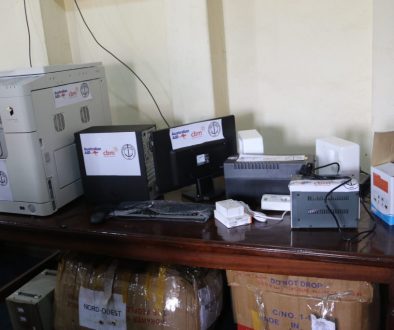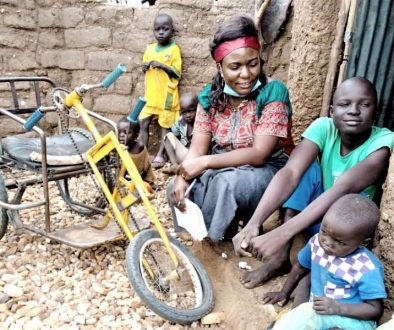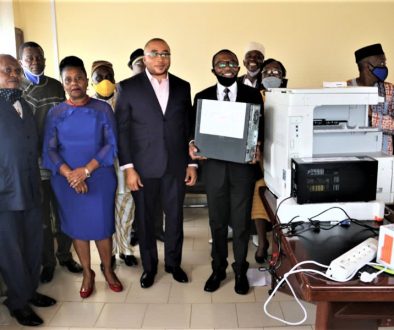CBM evaluates SEEPD Program phase 3 as it draws to a close
An evaluation team from CBM Australia Julie Smith is in Cameroon to evaluate the Socio Economic Empowerment of Persons with Disability (SEEPD) Program one of the partner programs of CBM Australia in Cameroon. On hand to receive the CBM team made up of CBM….Julie Smith and CBM Monitoring and Evaluation Officer in the CBM Country Office in Yaounde Tem Diaman was the SEEPD Program Manager Mr Awa Jacques Chirac, Chief of Secretariat at the DHS Office, Public Relation Officer of the CBCHS and the evaluation team in Bamenda appointment by the Director of CBCHS
Upon arrival on January 24th 2018, the CBM evaluator held a briefing meeting with the evaluators in Bamenda made up of Dr Louis Mbibeh, Mr Awa Jacques Chirac, Chick Sama and Wango Julius. During the meeting Julie clearly stated the objective of the evaluation and both evaluation team discussed on strategies to use during the evaluation as well as reviewing timeframe prepared ahead of her visit. Both team expressed gratitude for meeting each other and for the assignment bestowed on them during the two weeks of the evaluation
Presenting the evaluation team in the morning devotion of the DHS Central Administration the SEEPD Program Manager Mr Awa Jacques Chirac noted that Julie was in Cameroon to evaluate the SEEPD Program given that the current phase of the Program ends in December 2018. Speaking in the devotion, Julie pointed out that CBM has been a long time partner of the CBCHS for close to ten years. She appreciated the CBCHS for always being at the top of disability issue
The evaluation visit started with a workshop for the SEEPD Program coordination team during which Julie disclosed that the objective of her visit was to assess the achievements of the Program for the past years, the changes that have been recorded so that it could be documented and replicated in other communities given that CBM has many lessons to learn from the Program because SEEPD Program is a strong partner to CBM.
During the workshop Program staff highlighted changes that have occurred in the areas of Inclusive Education, Medical, Community, Livelihood, Gender Child Protection and Communication Components . According to the Project officers, the changes have led to change of perceptions and attitude on disability issues with many persons with disability taking leadership positions in their community, gaining financial autonomy and more persons with disability having access to education. The team also shared their challenges that have been a limitation for them not to achieve as they would have loved. They highlighted challenges like, lack of government policy to promote inclusive development, the recent political instability, poverty, amongst others
The workshop was proceeded by another workshop the following day with education stakeholders of on inclusive education which took place at the Delegation of Secondary Education during which education stakeholders shared their lessons learnt and challenges in implementing inclusive education . Parents of children with disability also held a meeting with the evaluation team at GBHS Bamenda where they underlined the benefits of inclusive education to their children and challenges that the children faced in acquiring education .
The evaluation ends in February with a feedback report from the evaluation team to stakeholders of the Northwest region on what they have so far gathered from beneficial and stakeholders of the Program .


